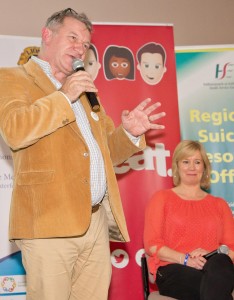
Robert Carley, pictured with Suicide Or Survive founder Caroline McGuigan, were among the captivating speakers at the 'Positive Mental Health and You' event held at the Crystal Leisure Centre on Tuesday last. (See News 24 & 25 for more) | Photo: John Power
Fear. It’s a word that thundered through Twitter, fanned through Facebook and cornered vast chunks of the post US presidential election narrative on Wednesday last.
The previous night, another four letter word ran through my mind like Bison across a prairie, over and over, as I listened to a series of terrific speeches at the Crystal Leisure Centre. And that word was hope.
As I took my place among the speakers during the post-speech debate (which I moderated) during the ‘Positive Mental Health and You’ event, I did so with a notebook full of hastily, happily written notes. It was one of those nights. One of the good nights. A night I was privileged to play some small part in.
Also on my lap was a copy of Dr Bob Rotella’s ‘How Champions Think: In Sports and in Life’.
For those of you who aren’t golf fanatics, three-time Major champion Pádraig Harrington is one of the many athletes who has availed of Dr Rotella’s world-renowned sports psychology down through the years.
And of the many quotes I leafed through – when not scribbling down notes, that is – a paragraph at the end of a chapter titled ‘Going Through The Fire’ caught my eye.
It felt appropriate for the night that was in it, and had time allowed, I’d have shared it with the audience. However, I’m glad I retained the bookmark to share his message this week, because I feel there’s something we can all draw from Bob Rotella’s words.
“The reality is that if your dream is to accomplish something awesome, it’s not going to be easy. If it were easy, everyone would be doing it. People who go for greatness are going to get knocked down a lot. They’ll have difficult times. They’ll struggle with doubt and uncertainty. People around them will question the wisdom of their quest. The issue is not whether you’ll fail, because you will. It’s whether you’ll get back up and keep going. It’s whether you can sustain your self-confidence and your belief in yourself and keep bouncing back. Failure is only final when you stop striving.”
Dreams don’t have to be grand in scale. Conquering the perfectly ordinary and mastering the utterly mundane is as good a place to start as any when discussing positive mental health.
Sometimes, and this was a point I raised at the Crystal Leisure Centre, getting up out of bed in the morning, getting through your day’s work and functioning can represent a great day for someone going through that fire Bob Rotella chaptered about.
And for me, that’s at the heart of the ‘Little Things’ campaign which you can learn more about by visiting www.yourmentalhealth.ie.
And if one gets enough little things in a row on a daily basis, life can, bit by bit, little by little, become more tolerable.
In a recent Sunday Independent column, Joe Brolly questioned some of those who have turned wishful thinking into a lucrative profession over the past 20 years, “bringing a delusional and unhealthy message of self-transformation and self-obsession to the masses”.
Joe, as is so often the case, was right up to a certain point. We can’t all run four-minute miles or become millionaires. We can’t think cancer away. And anyone suggesting that you could do any or all of the aforementioned is pedalling snake oil and nothing more.
“These motivators have replaced God,” Brolly adds, and there’s no escaping that in certain instances. But not in all.
As someone who regularly dips in and out of the works of Bob Rotella and the late UCLA basketball coach John Wooden, I’m not going to pretend I haven’t taken something from their words. But, just as I’d never write off psychology in one fell swoop, nor shall I atomise sports psychology.
Neither Bob Rotella or John Wooden have transformed my life – my mind is my own and my outlook is mine alone to craft and manage – but the fact that their message is primarily rooted in common sense, rather than ‘televangelical’ affirmation, resonates well with me.
Sometimes, there is great consolation to be gleaned from the words of others, be they spoken or written. And that brings me back to those little things, and why they matter.
When we Irish are asked how we are, more often than not, we reply with “not too bad”.
I find it curious that we offer a reply which contains a negative, even in a great many instances, there’s no intent in the use of that word.
But wouldn’t it be great to change that? Try it yourself for the next few weeks. ‘Drop that bad’, as the kids might hashtag it on Twitter.
“You know that statistic about one in four people in this country having a mental health issue?” said Suicide Or Survive’s Robert Carley on Tuesday last.
“Here’s a better statistic. Four in four people have an issue with their mental health. Every one of us…but no-one wants to talk about it.”
As a nation, we clearly have a long way to go in terms of more of us confiding in at least one other person about low mood, depression or feeling suicidal. I sense Robert knowingly took licence when suggesting no-one wants to talk about it. He wants to talk about it. Almost 300 people at the Crystal Centre last Tuesday want to talk about it. And that makes me hopeful. Things can get better. Life can become more tolerable. And if it takes a ‘Little By Little’ approach to reach that destination, then so be it. As the song tells us: “The inside might be as black as the night but at the end of the tunnel, there’s a light.”

